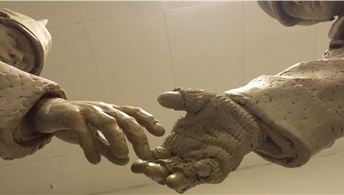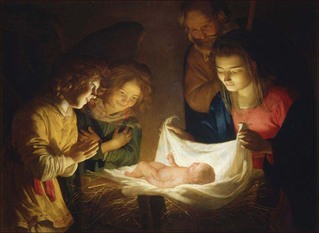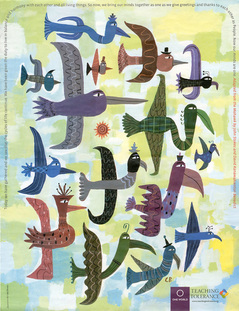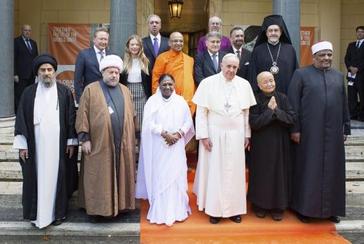 sculpture by Andrew Edwards
sculpture by Andrew Edwards This truce has become the stuff of legend and the film movingly portrays the common humanity of men who from their childhood had been taught to see the other as the enemy and yet recognised in one another the love and concern for family, the pain of separation, the horror of war and fear of what it might entail. For the men a truce at Christmas time seemed the human and Christian thing to do but their superiors saw it as treason and not only objected but punished them, disbanding their units and sending the men to the front line so that it's unlikely that any of them survived much beyond that Christmas. A particularly chilling scene in the film is when the Bishop gives a sermon to the soldiers quoting a passage from scripture which suggests that war is part of the gospel message and the only good German is a dead one - reminiscent of what the Germans said about the Jews during the Second World War.
This year the truce was celebrated in a number of football matches organised by British consulates around the world that included Tunisia, Japan, Croatia, Slovakia, Slovenia, Macedonia, Cyprus, and the United States, as well as European countries.
In Israel, a youth soccer competition was organised by Matthew Gould, the British ambassador to Israel, for more than 200 Arab and Jewish students from the Haifa region of northern Israel. The ambassador told them "Just for a short moment, the [soldiers] put all their differences to one side to find a spark of shared humanity, Today Jewish, Arab, and Druze are coming together here to play football, which breaks down barriers between communities. It is a really lovely way to remember what happened 100 years ago." This was particularly significant coming as it did after the recent hostilities in Gaza. An Arab-Israeli football commentator on Israel Radio said "Right now, we're not just in a crisis situation, we are in a total and utter collapse ... . here, we have an island of equality, and we need to develop projects like this ... especially at this age. This is when we can change the next generation." A number of professional soccer players from Maccabi Haifa and Maccabi Tel Aviv teams also joined the tournament, supporting the idea of peace and tolerance through sport.
And the young people agreed. Here are some of their comments:
"I learned that it doesn't matter if someone is Arab or not, you need to give them respect,"
"I came because I wanted to play and have fun and make new friends, and meet people from other schools,"
"I'm really happy to be here because we get to meet new people ... We're all in this together, holding hands,"
The football tournament seems to have been well received though in the past Fatah has objected to this kind of fraternalisation with those they consider the enemy. As we face the cusp of a new year, as we look back on what is now behind us and look forward to what is to come we can pray and hope that humanity will win over religion, ideology and division. Perhaps then we can walk the way of peace into a new future for this world for which we are all responsibile.
( with thanks to Melanie Lidman , the Middle East and Africa correspondent for Global Sisters Report, a project of the National Catholic Reporter for news of the Israeli tournament)





 RSS Feed
RSS Feed
